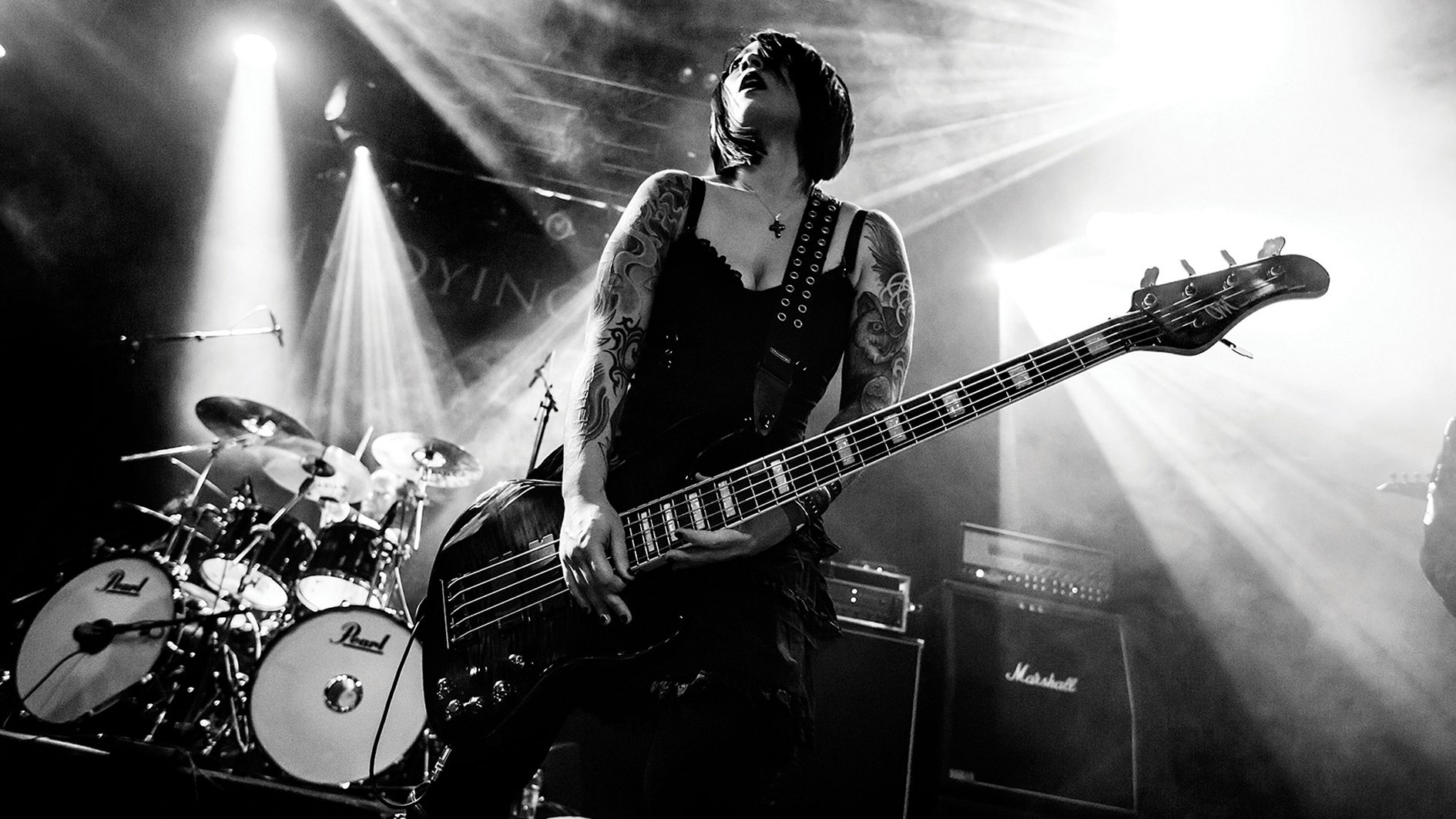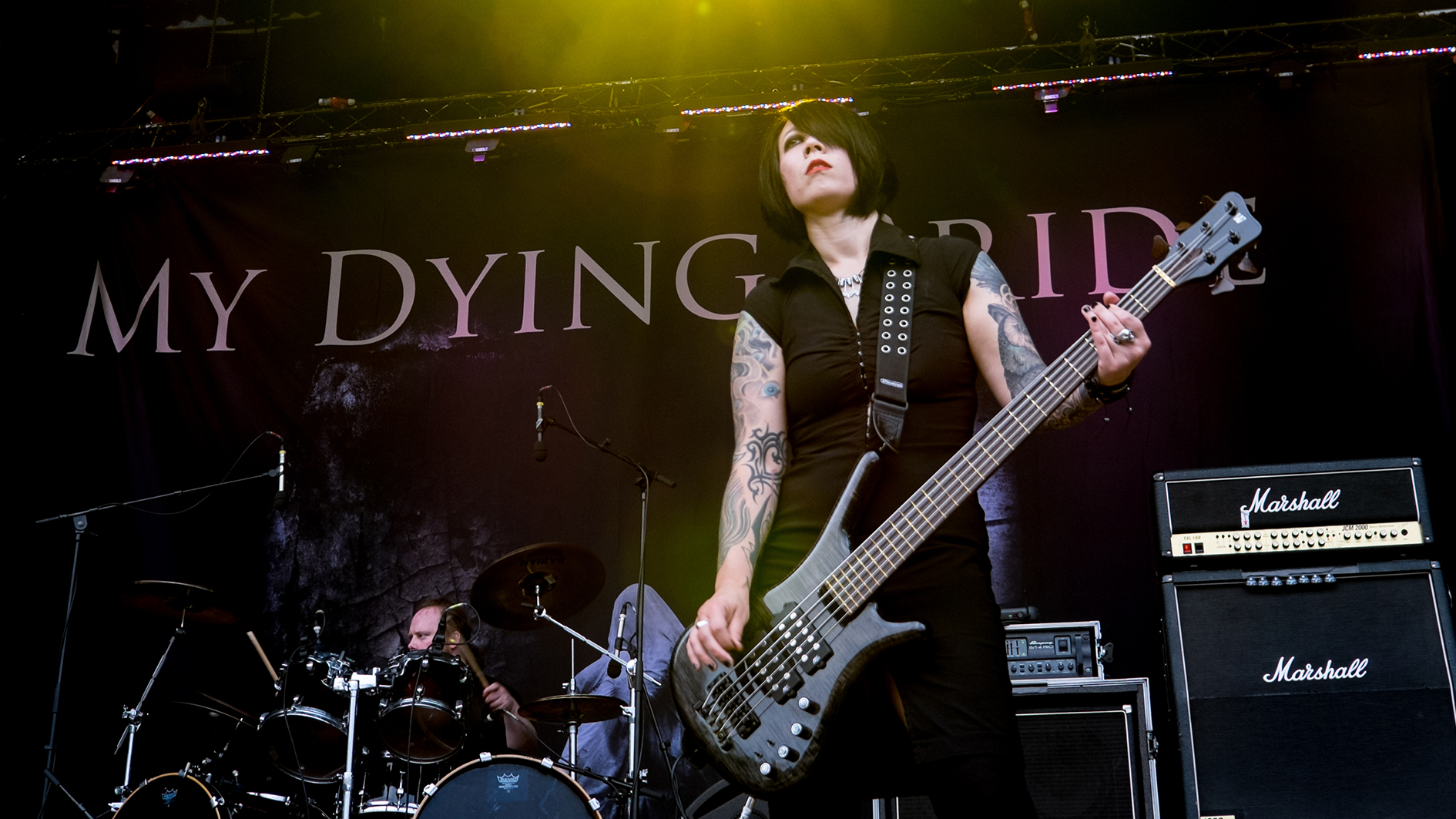My Dying Bride's Lena Abe: "When you’re playing slow, it’s even more noticeable if your timing’s not bang-on"
The doom-metal bassist talks playing exclusively with a pick and the creation of the band's latest album, The Ghost of Orion

All the latest guitar news, interviews, lessons, reviews, deals and more, direct to your inbox!
You are now subscribed
Your newsletter sign-up was successful
I started playing bass when I was 10 years old. My dad’s a musician, he plays bass and keyboards professionally, so there was always music around when I was a kid. He had a proper 80s-looking Washburn, a white one, and I would watch him play it and think ‘How do you do that?’ because I would pluck it and it sounded nothing like it did when he played it.
So I asked him to teach me to play, and that was my start. It’s a huge advantage for any musician if they have parents who encourage them to play. I didn’t have lessons, it was just me and my dad. He set me up with the basics and then I learned myself. He’s still gigging at 70 years old, which I think is fantastic.
When I was starting out I admired Cliff Burton, who was a major influence. He played incredible melodies, and the distortion he used just blew me away. Justin Chancellor of Tool, too; I heard their first EP when I was just starting out in the 90s, and I thought ‘What on earth is this?’

I loved Les Claypool’s playing for the same reasons - when I heard Sailing The Seas Of Cheese, I had no idea that basses could make that noise. It was weird - sort of playground-like and playful, but also spooky. And then it was Bill Gould as well, I’d never seen playing like that.
I was just in local metal bands before I joined My Dying Bride in 2007. I was only 24, and it was a big step up for me when I joined, but the guys were so professional and they helped me with certain parts. It went pretty smoothly. When I first joined MDB I had an Ibanez six-string, and I got a fair bit of criticism for it.
People used to say ‘You’re in a doom metal band, what do you need six strings for?’ but my answer was always ‘When I’m at home, I want to play!'
People used to say ‘You’re in a doom metal band, what do you need six strings for?’ but my answer was always ‘When I’m at home, I want to play!’ It got stolen in an airport.
I recorded the new album, The Ghost Of Orion, using a Mayones B5 Gothic, which I love for recording. It’s incredible. Everyone who plays it says to me ‘Why would you want to play anything else?’
All the latest guitar news, interviews, lessons, reviews, deals and more, direct to your inbox!
I’ve been endorsed by them since 2008, when they approached us. I hadn’t heard of them before that, because they were only in Poland at the time, but they looked great and I thought they’d be worth a shot. As soon as I played them, I was sold.
Apart from the Mayones, I have a Gibson Thunderbird five-string which I like because I play quite low. I move the top strap button away from the neck, so you don’t get that neck dive. That’s pretty much all I use. I used to have a Warwick bass, which looked fantastic but didn’t sound quite right in our band.
I only play five-strings. The necks on four-strings are a bit too thin for me. I like a chunky neck. The low range is essential because the rest of the band tune to C#.
I use a pick, every time, for consistency. I played guitar when I was a kid and it made sense to stick with that style. I try to keep it simple but strong, if that makes sense. It doesn’t need to be fancy because there’s violins and keyboards as well as guitars: it’s almost like classical music in that sense.
When you're playing slow, it's more noticeable if it's not bang-on. You can't just mask it with distortion!
We’re not really a traditional heavy metal band. We were at a festival once and Phil Anselmo was there, and said ‘You’re that romantic death metal band!’ For this album, I recorded all my parts in eight hours and then I was off. Happy days. This album’s been a long time in the making; I’ve got files on my computer called New Album 2016.
We’d spent a lot of time rehearsing, so the recordings went down really fast. I write all my own parts, but guitarist Andrew Craighan is the songwriter and the sound of the band is his own. We suggest arrangements and so on, but he does the bulk of the work. He gives us the riffs in the rehearsal room and we tweak it here and there.
We don’t know where it’s going to go until it all comes together. Our attitude is ‘We’re here now, let’s make it sound right while we’re together’.
I used an Ampeg SVT in the studio. No effects, just the sound of the bass as it is. The equipment is good enough that you don’t need to alter it. I rarely need any overdrive, but when I do I use a Boss pedal.
My playing has to be supportive, but I practice the hell out of it because it’s got to be really tight. When you’re playing slow, it’s even more noticeable if it’s not bang- on. You can’t just mask it with a load of distortion!
The Ghost Of Orion is available now via Nuclear Blast.
Bass Player is the world’s most comprehensive, trusted and insightful bass publication for passionate bassists and active musicians of all ages. Whatever your ability, BP has the interviews, reviews and lessons that will make you a better bass player. We go behind the scenes with bass manufacturers, ask a stellar crew of bass players for their advice, and bring you insights into pretty much every style of bass playing that exists, from reggae to jazz to metal and beyond. The gear we review ranges from the affordable to the upmarket and we maximise the opportunity to evolve our playing with the best teachers on the planet.

